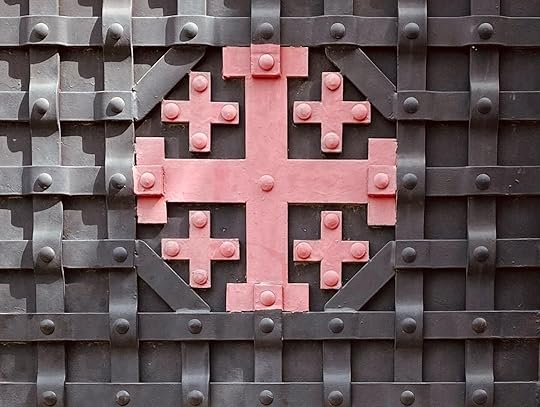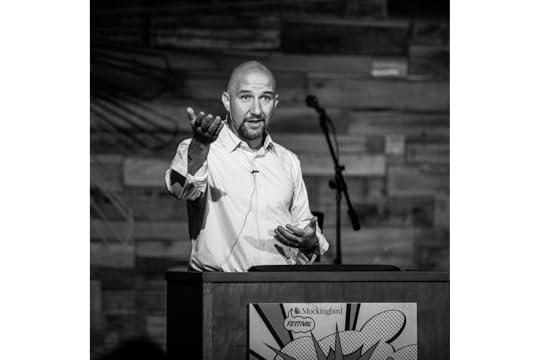Falling Upward

Thanks for reading Tamed Cynic by Jason Micheli ! Subscribe for free to receive new posts and support my work.
Every year during Passover week Jerusalem would be filled with approximately 200,000 Jewish pilgrims. Nearly all of them, like Jesus’ friends and family, would’ve been poor, tired of yet another foreign invasion leading to long, merciless occupation, and longing for revolution. Throughout that Holy Week these thousands of pilgrims would remember how they’d once suffered under a different empire and how God had heard their cries and sent someone to save them.
So every year at the beginning of Passover week, Pontius Pilate would journey from his seaport home in the west, Caesarea Maritima, to Jerusalem, escorted by a military triumph: a parade of horses and chariots and armed troops and bound prisoners, all led by imperial banners that declared “Caesar is Lord.”
A gaudy but unmistakeable display of power not unlike the patriotic extravaganzas Vladimir Putin has orchestrated in Russian football stadiums.
At the beginning of this same week, what we call Palm Sunday, Jesus journeys from the east.
His “parade” starts at the Mt of Olives, whence he enters the city all this week, about a mile and a half outside the city, the place where the prophet Zechariah had promised God’s Messiah would one day usher in a victory of God’s People over their enemies.
And establish peace.
The procession begins at the Mt of Olives, but, in Luke’s Gospel, Jesus’ journey to Jerusalem began all the way back in chapter nine. For ten chapters Jesus has journeyed from one town to another, teaching his way to Jerusalem. From Luke 9 to Luke 19, as Jesus has made his way to Jerusalem, it’s all been about teaching, his teaching, teaching about the Kingdom. It hasn’t been healing after healing after healing. It hasn’t been miracle after miracle after miracle. Jesus has taught his way to Jerusalem, taught about the Kingdom here and now, and our lives in it.
But when they get to the Mt of Olives, a place that’s charged with prophetic meaning, it’s not his teaching they want to acclaim. It’s his deeds. The mighty deeds. The deeds of the power. The healings and the miracles.
As if to say: if Jesus can do that just imagine what he can do to our enemies.
There are no palm branches in Luke’s Palm Sunday scene, no shouts of “Hosanna.” Not even any crowds. It’s just the disciples and some naysaying Pharisees and this King who’s riding a colt instead of a chariot.
The disciples lay their clothes on the road in front him. They sing about “peace” just as the angels had at his birth. Then they proclaim excitedly about his mighty deeds. And just as the disciples begin voicing their expectations and the city comes into view, Jesus falls down and weeps: “If you, even you, had only recognized the things that make for peace.”
He’s looking at the city but he’s speaking to his disciples. And he’s talking about the Kingdom, his teaching about God’s Kingdom.
With the city in view and excited shouts of mighty deeds ringing in the air, Jesus falls down and he cries. He weeps. Because after every sermon, every beatitude and parable and teaching moment we still don’t get it.
Or rather, we refuse to have the God who does God to us in this way. We’d rather have the mighty deeds.
In all four of the Gospels, there’s only two places where Jesus weeps. The first is over the grave of his friend Lazarus. The second time Jesus weeps it’s over us. He weeps because we refuse the way in which Jesus is the way God does God to us.
Give us the mighty deeds, Jesus, and we’ll take it from here; thank you very much.

Every year during Holy Week churches present Jesus and his cross as the divinely ordered (In Case of Emergencies, Break Glass) solution to the problem of the Fall. What Jesus does, undergoing suffering and crucifixion, allegedly undoes what Adam did. Whereas Adam did not take God at his word, taking the fruit in a bid to become like God himself, Jesus trusts God, as the Christ Hymn in Philippians sings, ‘even to the point of death— even death on a cross.” To offer Jesus as an oblation that fulfills original sin is to solve a problem the Old Testament itself does not espouse.
The human Jesus, for example, would not have grown up in synagogue learning about the Fall or humanity’s common bondage to original sin.
Both Fall and Original Sin are Christian terms. They must be Christian terms. Just as with everything else in the Gospel narratives, we can only glimpse what God has done to us in Jesus— and what we have done to God in Jesus— from a hindsight made possible by the absolute shock of God raising him from the dead.
If the most basic definition of sin is the refusal to let God be God, the Fall is not the downward plunge the word implies.
In refusing the God who is God and grasping for the job ourselves, we fall upward.
There is no more original or starker instance of sin, then, than our rejection of Jesus, desiring his mighty deeds but not him. We fall not in the Garden but on Golgotha. The First Adam, therefore, is understood only from the cross of the Second Adam. As Gerhard Forde puts it, it is only by what we do to Christ that we can understand what it means to say that we are all “in Adam.”
The terms Fall and Original Sin do not refer to the consequences of a mythical event in the past that somehow infect all of us hence.
They refer to the concrete, historical, undisputedly true event of the crucifixion of Jesus of Nazareth.
They name a bitter truth apocalypsed at a place called the Skull; namely, the condition of the world and our role in it is such that in rejecting Jesus we willingly— gleefully even— make the most ultimate kind of rejection, the rejection of God, and, as creatures made in God’s image, we also make the final contradiction of ourselves.
The story of Adam and Eve only becomes our story after someone like Peter preaches to us, “This Jesus whom you killed, God raised him up for your justification.”
Share Tamed Cynic by Jason Micheli
 Read Tamed Cynic by Jason Micheli in the new Substack appNow available for iOSGet the app
Read Tamed Cynic by Jason Micheli in the new Substack appNow available for iOSGet the app
Jason Micheli's Blog
- Jason Micheli's profile
- 13 followers



